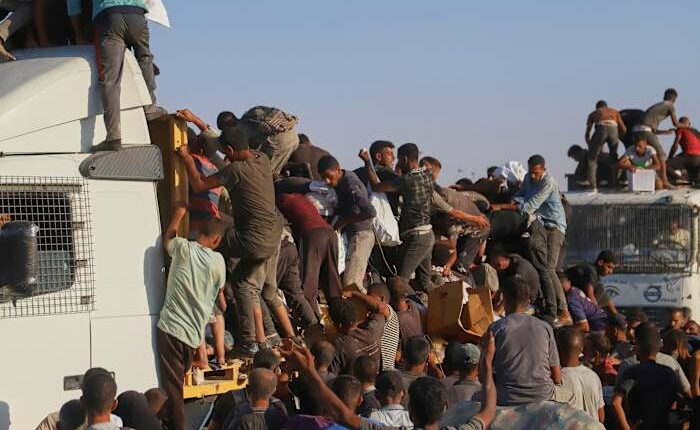Share this @internewscast.com

Truck drivers attempting to deliver aid inside Gaza report that their jobs have become increasingly perilous in recent months as desperation for food grows, and violent gangs seize control in the power vacuum left by the territory’s Hamas rulers.
According to local drivers, hungry crowds frequently snatch aid from moving trucks. Some vehicles are commandeered by armed men associated with gangs who resell the aid at high prices in Gaza’s markets. Israeli troops often fire into the disorder, they said.
Drivers have been killed in the mayhem.
Since March, when Israel ended a ceasefire with Hamas and stopped all imports, conditions have worsened in the territory of around 2 million Palestinians. International experts now caution about a “worst-case scenario of famine” in Gaza.
Amid intense international pressure, Israel announced actions to increase aid to Gaza last week. Though aid organizations argue it’s insufficient, drivers say transporting even the limited permitted aid from border crossings to those in need is both challenging and highly dangerous.
Driving aid trucks can be deadly
Thousands gathered by the road on Monday as two trucks entered southern Gaza, as captured by AP video. Young men swarmed the trucks, standing on cab roofs, clinging to the sides, and climbing over one another onto the truck beds to seize boxes while the vehicles continued moving slowly.
“Some of my drivers fear delivering aid due to their anxiety about disentangling themselves from large crowds,” remarked Abu Khaled Selim, vice president of the Special Transport Association, a nonprofit that collaborates with private transportation firms across the Gaza Strip and champions truck drivers’ rights.
Selim said his nephew, Ashraf Selim, a father of eight, was killed July 29 by a stray bullet when Israeli forces opened fire on crowds climbing onto the aid truck he was driving.
Shifa Hospital officials said they received his body with an apparent gunshot to the head. The Israeli military said it was unaware of the incident and that “as a rule” it does not carry out deliberate attacks on aid trucks.
Earlier in the war, aid deliveries were safer because, with more food getting into Gaza, the population was less desperate. Hamas-run police had been seen securing convoys and went after suspected looters and merchants who resold aid at exorbitant prices,
Now, “with the situation unsecured, everything is permissible,” said Selim, who appealed for protection so the aid trucks could reach warehouses.
The U.N. does not accept protection from Israeli forces, saying it would violate its rules of neutrality, and said that given the urgent need for aid it would accept that hungry people were going to grab food off the back of the trucks as long as they weren’t violent.
Flooding Gaza with renewed aid would ease the desperation and make things safer for the drivers, said Juliette Touma, communications director at UNRWA, the U.N. agency for Palestinian refugees.
The danger for drivers is growing
Ali al-Derbashi, 22, was an aid truck driver for more than a year and a half, but he quit after his last trip three weeks ago because of the increasing danger, he said. Some people taking aid off the trucks are now carrying cleavers, knives and axes, he said.
He was once ambushed and forcibly redirected to an area designated by Israel as a conflict zone in its war against Hamas. There everything was stolen, including his truck’s fuel and batteries, and his tires were shot out, he said. He was beaten and his phone was stolen.
“We put our lives in danger for this. We leave our families for two or three days every time. And we don’t even have water or food ourselves,” he said. In addition to the danger, the drivers faced humiliation from Israeli forces, he said, who put them through “prolonged searches, unclear instructions, and hours of waiting.”
The war began Oct. 7, 2023, when Hamas-led militants killed around 1,200 people, mostly civilians, and abducted 251 others. Israel’s retaliatory offensive has killed more than 61,000 Palestinians, according to the latest figures by Gaza’s Health Ministry, which doesn’t distinguish between militants and civilians and operates under the Hamas government.
The threats come from everywhere
Nahed Sheheibr, head of the Special Transport Association, said the danger for the drivers comes from everywhere. He accused Israel of detaining drivers and using them as human shields. The Israeli military did not comment on the accusation. In recent days, men linked to a violent Gaza clan fired at drivers, injuring one, and looted a convoy of 14 trucks, he said. They later looted a convoy of 10 trucks.
Hossni al-Sharafi, who runs a trucking company and was an aid driver himself, said he is only allowed to use drivers who have no political affiliation and have been approved by Israel to transport aid from crossings.
Al-Sharafi said he was detained by Israeli forces for more than 10 days last year while transporting aid from the southern Kerem Shalom crossing and interrogated about where the truck was headed and how the aid was being distributed. Israeli officials did not comment on the accusations.
Some drivers spoke of being shot at repeatedly by armed gangs. Others said their trucks were routinely picked clean — even of the wooden pallets— by waves of desperate people, many of whom were fighting each other for the food, while Israeli troops were shooting. Hungry families who miss out on the aid throw stones at the trucks in anger.
Anas Rabea said the moment he pulled out of the Zikkim crossing last week his aid truck was overwhelmed by a crowd.
“Our instructions are to stop, because we don’t want to run anyone over,” he said. “It’s crazy. You have people climbing all over the cargo, over the windows. It’s like you’re blind, you can’t see out.”
After the crowd had stripped everything, he drove another few hundred meters and was stopped by an armed gang that threatened to shoot him. They searched the truck and took a bag of flour he had saved for himself, he said.
“Every time we go out, we get robbed,” he said. “It’s getting worse day by day.”
——-
Associated Press writers Julia Frankel contributed to this report from Jerusalem and Sally Abou Aljoud from Beirut. Mariam Dagga contributed from Khan Younis, Gaza Strip.
Copyright 2025 The Associated Press. All rights reserved. This material may not be published, broadcast, rewritten or redistributed without permission.











